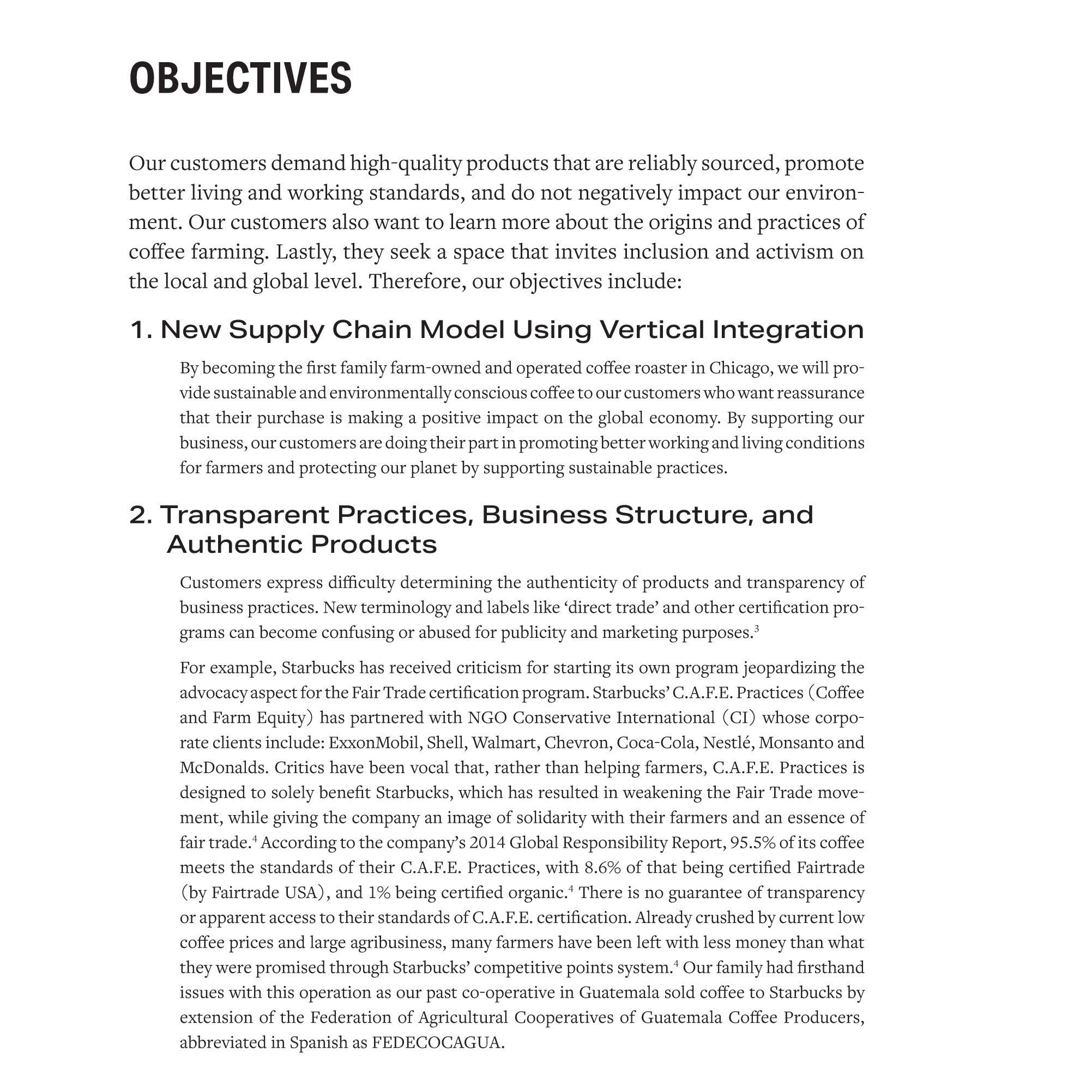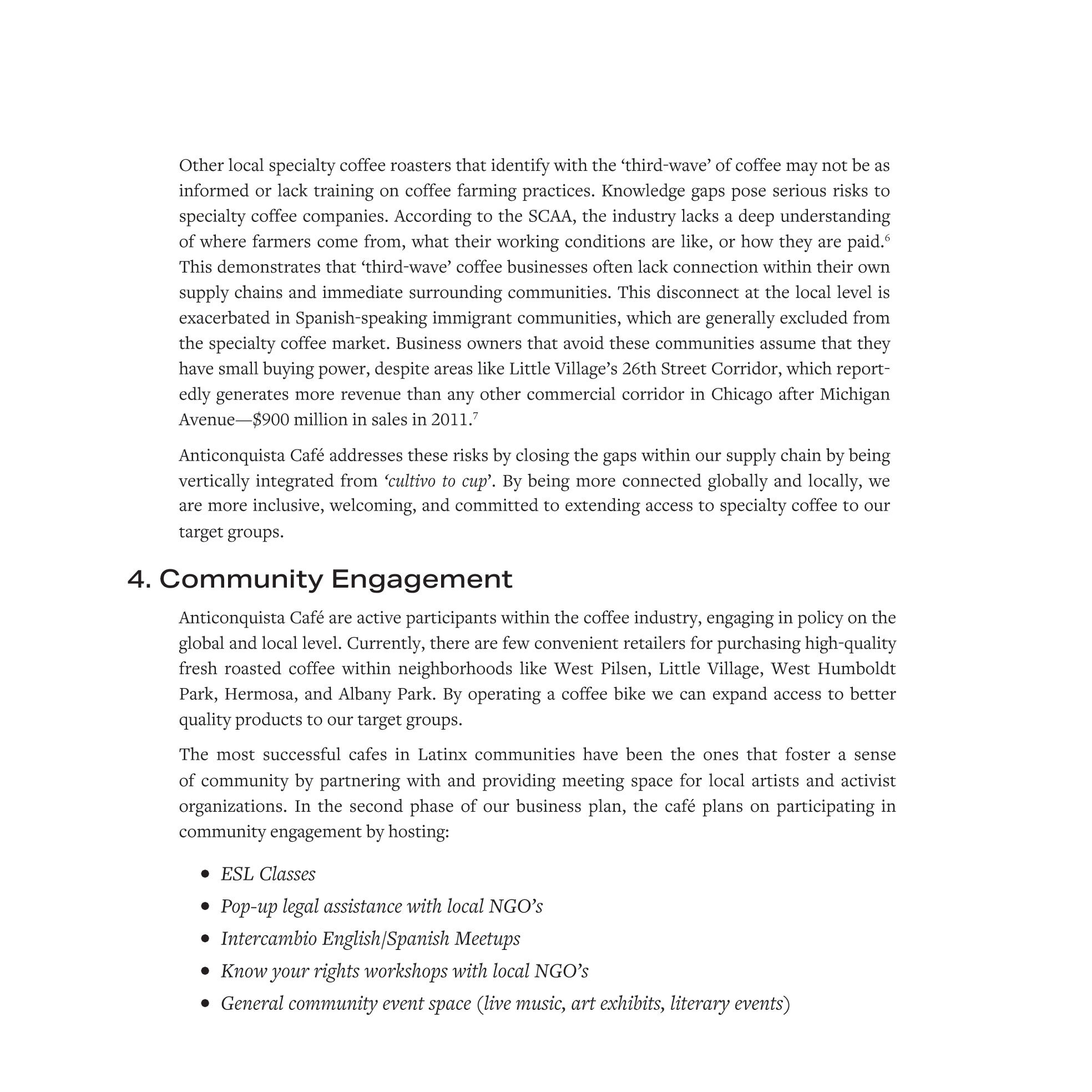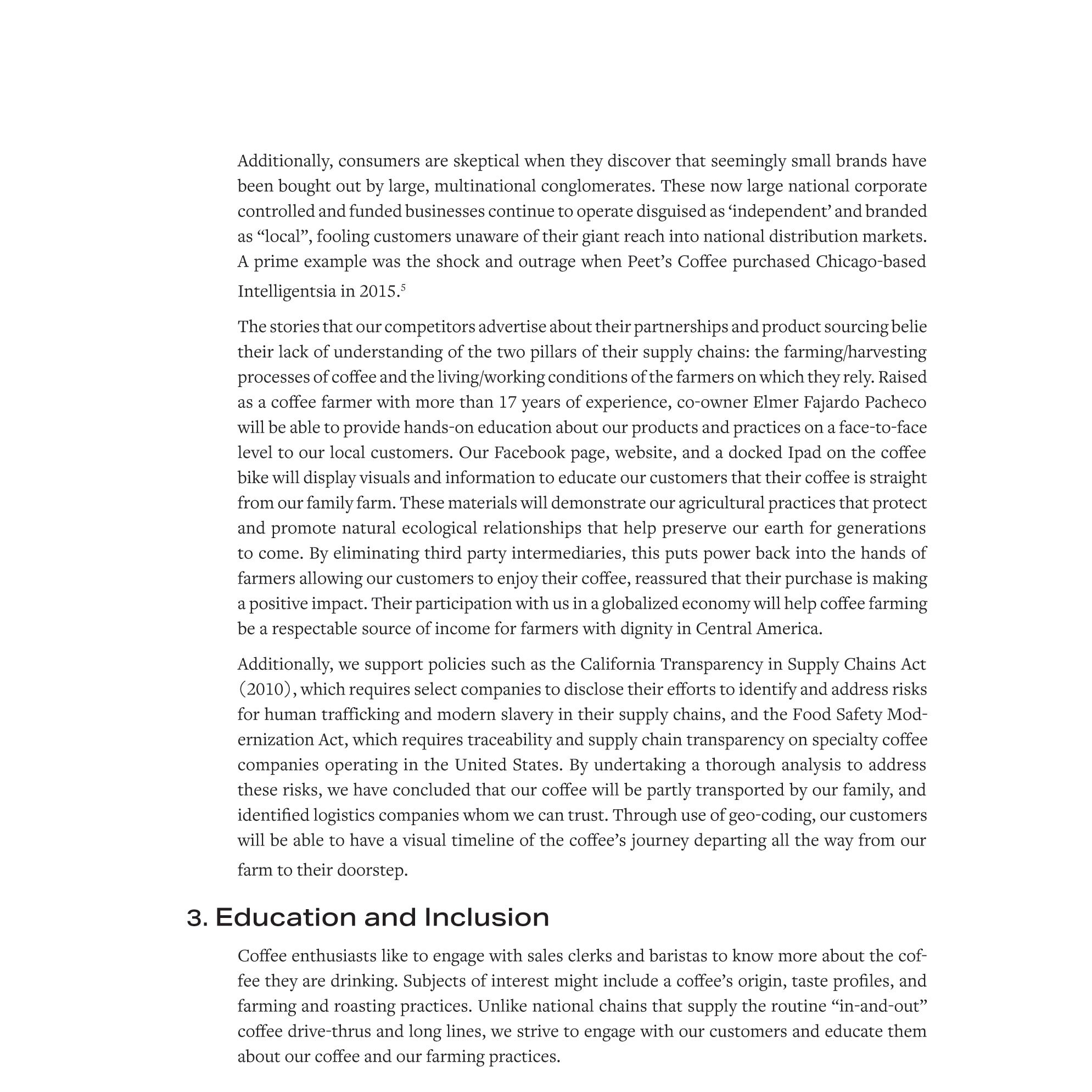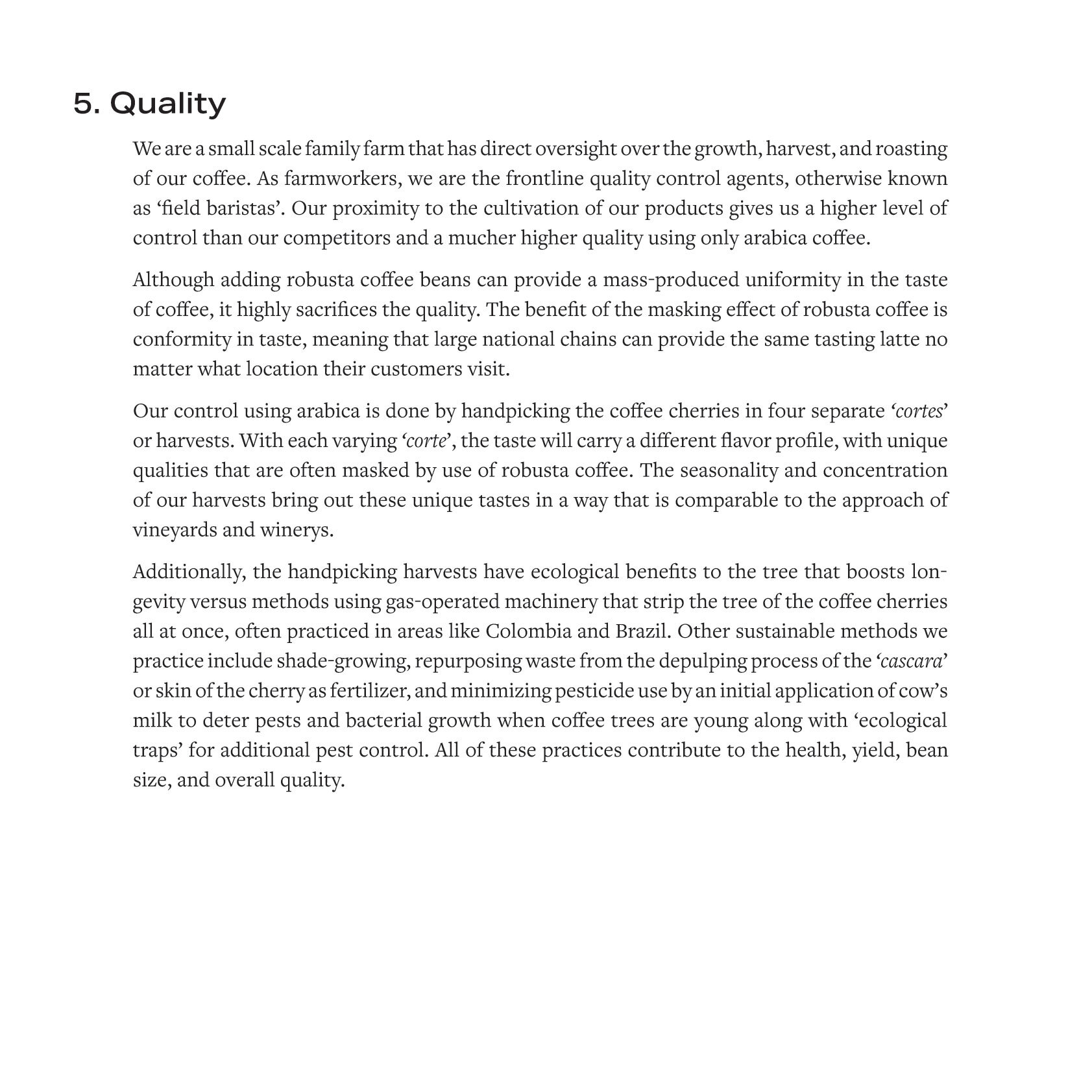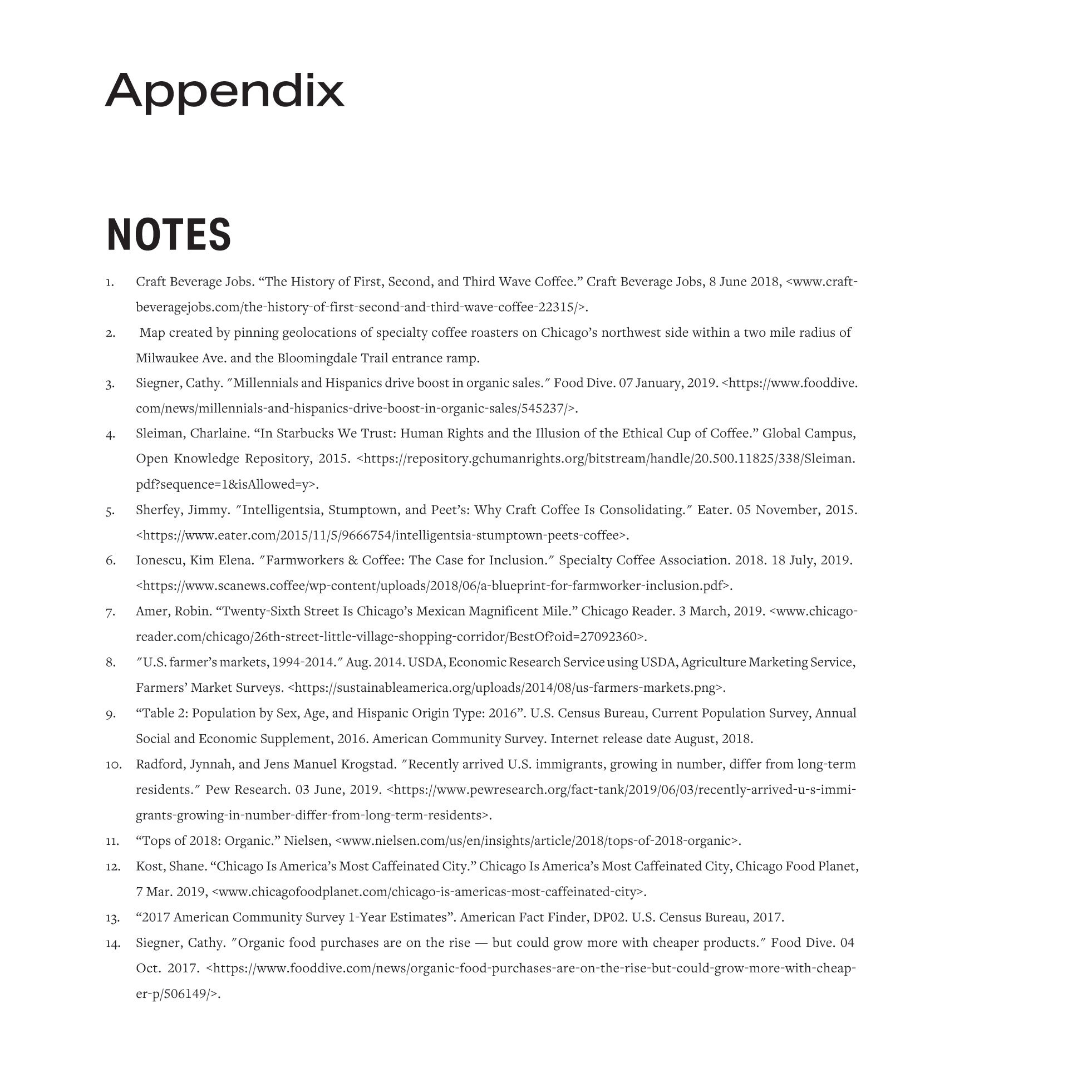Our Business Plan (5/5)
(5/5) Hope you like to read! We finish up our business plan post series with some nuggets of research & our business objectives:
New supply chain model
Transparent practices, business structure & authentic products
Education & Inclusion
Community Engagement
Quality
Live Text:
Objectives:
Our customers demand high-quality products that are reliably sourced, promote better living and working standards, and do not negatively impact our environment. Our customers also want to learn more about the origins and practices of coffee farming. Lastly, they seek a space that invites inclusion and activism on the local and global level. Therefore, our objectives include:
1. New Supply Chain Model Using Vertical Integration
By becoming the first family farm-owned and operated coffee roaster in Chicago, we will provide sustainable and environmentally conscious coffee to our customers who want reassurance that their purchase is making a positive impact on the global economy. By supporting our business, our customers are doing their part in promoting better working and living conditions for farmers and protecting our planet by supporting sustainable practices.
2. Transparent Practices, Business Structure, and Authentic Products
Customers express difficulty determining the authenticity of products and transparency of business practices. New terminology and labels like ‘direct trade’ and other certification programs can become confusing or abused for publicity and marketing purposes.3
For example, Starbucks has received criticism for starting its own program jeopardizing the advocacy aspect for the Fair Trade certification program. Starbucks’ C.A.F.E. Practices (Coffee and Farm Equity) has partnered with NGO Conservative International (CI) whose corporate clients include: ExxonMobil, Shell, Walmart, Chevron, Coca-Cola, Nestlé, Monsanto and McDonalds. Critics have been vocal that, rather than helping farmers, C.A.F.E. Practices is designed to solely benefit Starbucks, which has resulted in weakening the Fair Trade movement, while giving the company an image of solidarity with their farmers and an essence of fair trade.4 According to the company’s 2014 Global Responsibility Report, 95.5% of its coffee meets the standards of their C.A.F.E. Practices, with 8.6% of that being certified Fairtrade (by Fairtrade USA), and 1% being certified organic.4 There is no guarantee of transparency or apparent access to their standards of C.A.F.E. certification. Already crushed by current low coffee prices and large agribusiness, many farmers have been left with less money than what they were promised through Starbucks’ competitive points system.4 Our family had firsthand issues with this operation as our past co-operative in Guatemala sold coffee to Starbucks by extension of the Federation of Agricultural Cooperatives of Guatemala Coffee Producers, abbreviated in Spanish as FEDECOCAGUA.
Additionally, consumers are skeptical when they discover that seemingly small brands have been bought out by large, multinational conglomerates. These now large national corporate controlled and funded businesses continue to operate disguised as ‘independent’ and branded as “local”, fooling customers unaware of their giant reach into national distribution markets. A prime example was the shock and outrage when Peet’s Coffee purchased Chicago-based Intelligentsia in 2015.5
The stories that our competitors advertise about their partnerships and product sourcing belie their lack of understanding of the two pillars of their supply chains: the farming/harvesting processes of coffee and the living/working conditions of the farmers on which they rely. Raised as a coffee farmer with more than 17 years of experience, co-owner Elmer Fajardo Pacheco will be able to provide hands-on education about our products and practices on a face-to-face level to our local customers. Our Facebook page, website, and a docked Ipad on the coffee-bike will display visuals and information to educate our customers that their coffee is straight from our family farm. These materials will demonstrate our agricultural practices that protect and promote natural ecological relationships that help preserve our earth for generations to come. By eliminating third party intermediaries, this puts power back into the hands of farmers allowing our customers to enjoy their coffee, reassured that their purchase is making a positive impact. Their participation with us in a globalized economy will help coffee farming be a respectable source of income for farmers with dignity in Central America.
Additionally, we support policies such as the California Transparency in Supply Chains Act (2010), which requires select companies to disclose their efforts to identify and address risks for human trafficking and modern slavery in their supply chains, and the Food Safety Modernization Act, which requires traceability and supply chain transparency on specialty coffee companies operating in the United States. By undertaking a thorough analysis to address these risks, we have concluded that our coffee will be partly transported by our family, and identified logistics companies whom we can trust. Through use of geo-coding, our customers will be able to have a visual timeline of the coffee’s journey departing all the way from our farm to their doorstep.
3. Education and Inclusion
Coffee enthusiasts like to engage with sales clerks and baristas to know more about the coffee they are drinking. Subjects of interest might include a coffee’s origin, taste profiles, and farming and roasting practices. Unlike national chains that supply the routine “in-and-out” coffee drive-thrus and long lines, we strive to engage with our customers and educate them about our coffee and our farming practices.
Other local specialty coffee roasters that identify with the ‘third-wave’ of coffee may not be as informed or lack training on coffee farming practices. Knowledge gaps pose serious risks to specialty coffee companies. According to the SCAA, the industry lacks a deep understanding of where farmers come from, what their working conditions are like, or how they are paid.6 This demonstrates that ‘third-wave’ coffee businesses often lack connection within their own supply chains and immediate surrounding communities. This disconnect at the local level is exacerbated in Spanish-speaking immigrant communities, which are generally excluded from the specialty coffee market. Business owners that avoid these communities assume that they have small buying power, despite areas like Little Village’s 26th Street Corridor, which reportedly generates more revenue than any other commercial corridor in Chicago after Michigan Avenue--$900 million in sales in 2011.7
Anticonquista Café addresses these risks by closing the gaps within our supply chain by being vertically integrated from ‘cultivo to cup’. By being more connected globally and locally, we are more inclusive, welcoming, and committed to extending access to specialty coffee to our target groups.
4. Community Engagement
Anticonquista Café are active participants within the coffee industry, engaging in policy on the global and local level. Currently, there are few convenient retailers for purchasing high-quality fresh roasted coffee within neighborhoods like West Pilsen, Little Village, West Humboldt Park, Hermosa, and Albany Park. By operating a coffee bike we can expand access to better quality products to our target groups.
The most successful cafes in Latino/Latinx communities have been the ones that foster a sense of community by partnering with and providing meeting space for local artists and activist organizations. In the second phase of our business plan, the café plans on participating in community engagement by hosting:
• ESL Classes
• Pop-up legal assistance with local NGO’s
• Intercambio English/Spanish Meetups
• Know your rights workshops with local NGO’s
• General community event space (live music, art exhibits, literary events
5. Quality
We are a small scale family farm that has direct oversight over the growth, harvest, and roasting of our coffee. As farmworkers, we are the frontline quality control agents, otherwise known as ‘field baristas’. Our proximity to the cultivation of our products gives us a higher level of control than our competitors and a mucher higher quality using only arabica coffee.
Although adding robusta coffee beans can provide a mass-produced uniformity in the taste of coffee, it highly sacrifices the quality. The benefit of the masking effect of robusta coffee is conformity in taste, meaning that large national chains can provide the same tasting latte no matter what location their customers visit.
Our control using arabica is done by handpicking the coffee cherries in four separate “cortes” or harvests. With each varying ‘corte’, the taste will carry a different flavor profile, with unique qualities that are often masked by use of robusta coffee. The seasonality and concentration of our harvests bring out these unique tastes in a way that is comparable to the approach of vineyards and winerys.
Additionally, the handpicking harvests have ecological benefits to the tree that boosts longevity versus methods using gas-operated machinery that strip the tree of the coffee cherries all at once, often practiced in areas like Colombia and Brazil. Other sustainable methods we practice include shade-growing, repurposing waste from the depulping process of the ‘cascara’ or skin of the cherry as fertilizer, and minimizing pesticide use by an initial application of cow’s milk to deter pests and bacterial growth when coffee trees are young. All of these practices contribute to the health, yield, bean size, and overall quality.
Sources:
3. Siegner, Cathy. "Millennials and Hispanics drive boost in organic sales." Food Dive. 07 January, 2019.
4. Sleiman, Charlaine. “In Starbucks We Trust: Human Rights and the Illusion of the Ethical Cup of Coffee.” Global Campus, Open Knowledge Repository, 2015.
5. Sherfey, Jimmy. "Intelligentsia, Stumptown, and Peet’s: Why Craft Coffee Is Consolidating." Eater. 05 November, 2015.
6. Ionescu, Kim Elena. "Farmworkers & Coffee: The Case for Inclusion." Specialty Coffee Association.” 2018. 18 July, 2019.
7. Amer, Robin. “Twenty-Sixth Street Is Chicago's Mexican Magnificent Mile.” Chicago Reader. 3 March, 2019.

